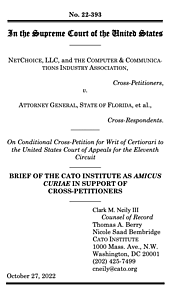Learn more about Cato’s Amicus Briefs Program.
In May of last year, Florida enacted a law imposing severe restrictions on the editorial freedom of large social media platforms, ostensibly in an effort to stop “censorship” of conservative viewpoints. The law imposes both content moderation restrictions and transparency requirements. The content moderation restrictions require platforms to host and display any and all posts by registered political candidates and “journalistic enterprises,” ban platforms from changing how they moderate more than once every thirty days, and allow platforms to be sued for up to $100,000 for each post they moderate “inconsistently.” The transparency requirements compel disclosure of private editorial processes, including detailed definitions platforms use to identify offensive content and spam.
NetChoice, a trade association of online businesses, brought a First Amendment suit in federal court against Florida, arguing that the law infringes on private platforms’ right to choose the content they host. The district court ruled in favor of NetChoice and preliminarily enjoined the entirety of the law. Florida appealed to the Eleventh Circuit (where Cato previously filed in support of NetChoice). The Eleventh Circuit affirmed the district court’s injunction on the law’s content moderation restrictions but reversed it on the transparency requirements. Florida then filed a petition to the Supreme Court,
asking it to take up the case and partially reverse the Eleventh Circuit’s judgment so that the entirety of the law may go into effect. NetChoice has now filed a cross-petition to the Supreme Court, asking the Court to take the case and reverse a different part of the Eleventh Circuit’s judgment so that the entirety of the law is blocked from going into effect. Cato has filed an amicus brief in support of NetChoice’s cross-petition.
In our brief, we explain that the First Amendment explicitly prohibits the government from censoring private speech and media. And as the Eleventh Circuit noted, the fact that the First Amendment’s fundamental guarantees cannot be tossed aside for short-term, partisan ends “would be too obvious to mention if it weren’t so often lost or obscured in political rhetoric.” However, from Florida to California, politicians of all stripes have introduced over 100 bills in the last year to control what content gets shared on the internet. Giving the government the power to compel, suppress, or evaluate speech does not combat censorship; it is the very definition of censorship—and precisely what the First Amendment was written to prevent.
Florida’s law would chill platforms’ protected speech, undermine their right to exclude, and violate the privacy interest that social media platforms have in their editorial source data. The law’s disclosure requirements would hand malicious actors a blueprint to circumvent website security measures, inviting an influx of spam and vile content. And the law’s content moderation restrictions would give journalistic enterprises and registered political candidates carte blanche to post threats, racial slurs, and other vile content—content that would surely fall beyond Florida’s understanding of suppressed “conservative” viewpoints.
The Fifth Circuit (where Cato also filed in support of NetChoice) recently upheld a substantially similar Texas law regulating social media. That decision conflicts with part of the Eleventh Circuit’s holding, creating disagreement among lower courts about the extent of First Amendment protection for online speech. Without clarification from the Supreme Court, states will usher in a new era of overweening regulation, creating a domestic “splinternet” where information available to users will become regionally divided based on which content local politicians prefer. To prevent the First Amendment from becoming a hollow guarantee in the digital age, the Supreme Court should grant review and strike down all of the Florida law.

This work is licensed under a Creative Commons Attribution-NonCommercial-ShareAlike 4.0 International License.



